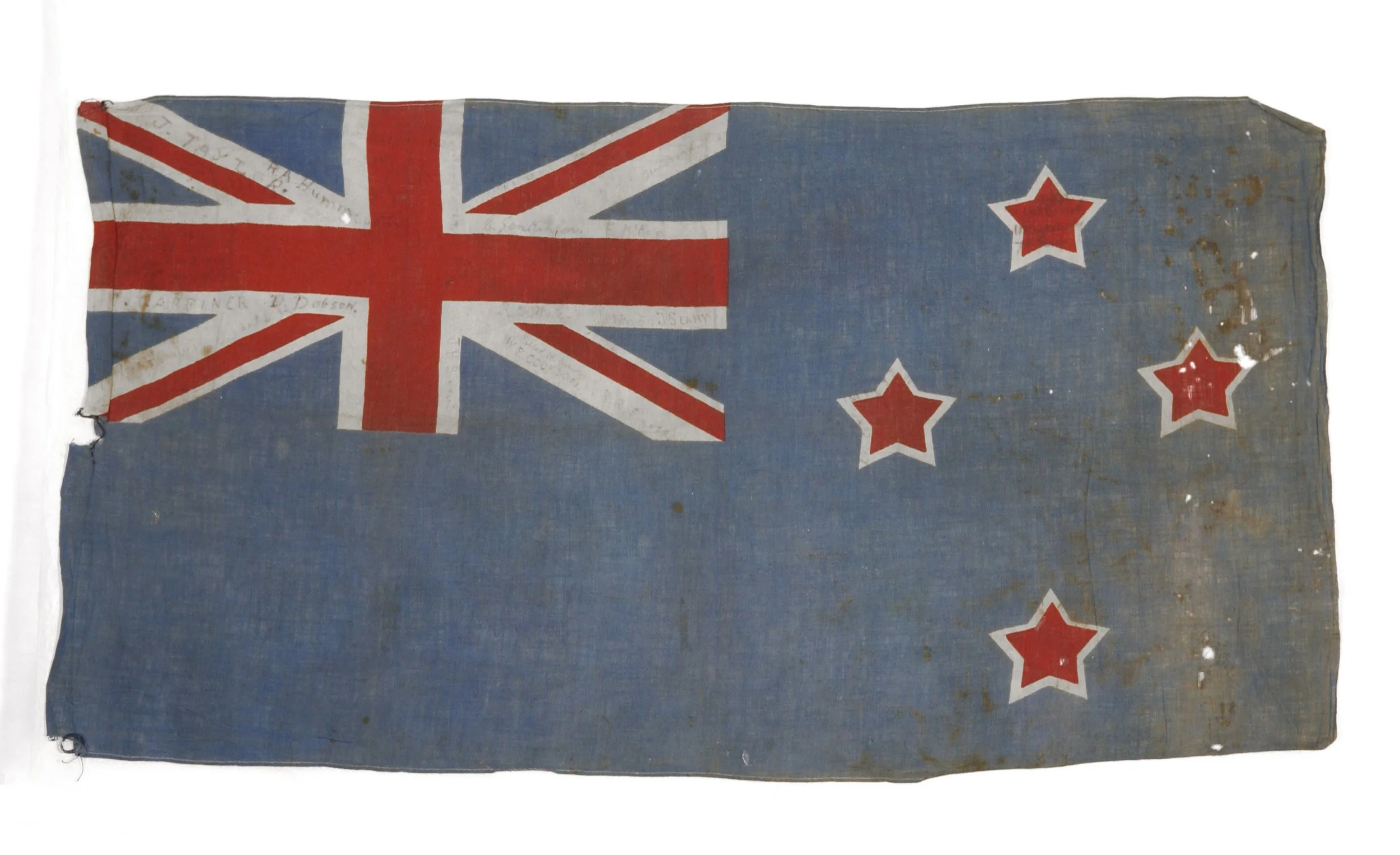A Canny View Commemoration
August 8th marked the 110th anniversary. Today, I will pause from my usual financial themed article for one of reflection and gratitude in memory of all who fell; the 313 souls of the Wellington Battalion who gave their lives for freedom's cause.
WWI New Zealand Ensign attributed to 6/159 Private John Taylor – Quinn’s Post, Gallipoli (cropped). Collection of the National Army Museum Te Mata Toa (2000.533). Image used with permission.
There are moments in a nation's history when time itself seems to pause - when the very essence of what a people might become hangs in the balance on a distant hillside.
For New Zealand, that moment came at dawn on August 8, 1915, when Lieutenant-Colonel William Malone led his Wellington Battalion up the slopes of Chunuk Bair. The Wellington Battalion occupied the summit before dawn on 8 August, finding it surprisingly undefended.
But with the sunrise came a barrage of fire from Ottoman Turks holding higher ground, and a desperate struggle ensued.
The peak was hard to defend – only shallow trenches could be scraped amongst the rocks, exposed to fire from Battleship Hill to the south and Hill Q to the north. As the day wore on, the situation became even more dire. Short of ammunition and with precious little water, they resorted to urinating into their Maxim machine guns' cooling systems to keep them operational - a documented wartime practice when water supplies ran out during intense fighting.
Finally, defenders were reduced to hand-to-hand combat with bayonets. Meanwhile, troops unaccustomed to mountain warfare fought in the scorching heat for hours, facing appalling conditions that tested the very limits of human endurance.
For one brief moment, New Zealand soldiers stood atop the highest point of the Sari Bair range; looking across the Dardanelles, with ancient Troy to their right, and to a Europe at their left that had never seemed so close yet so impossibly distant.
From that elevated position, they could see to the other side of the Dardanelles. It was a vista of both promise and peril - the tantalising possibility of breakthrough, and the terrible reality of what such victories demanded.
More than names on memorial walls
The courage displayed on Chunuk Bair was distinctly our own: Antipodean resourcefulness, married to unwavering duty, executed with the moral bravery that would define the New Zealand character.
Take Lieutenant-Colonel Malone as an example of everything finest about New Zealand leadership. When ordered to repeat the Auckland Battalion's ill-fated daylight attack on August 7, Malone refused, declaring he was "not going to ask my men to commit suicide"[i] and insisting his battalion would capture Chunuk Bair after dark.
Malone led from the front throughout that terrible day, conducting the defence with rifle and bayonet in hand, reportedly doing jobs from Lance Corporal to Brigadier General. He was killed around 5pm by artillery fire, possibly from friendly forces. His death marked not just the loss of a remarkable soldier, but the end of an era of innocence for a young nation.
Among those who fell was John Blair Thompson, my great-great uncle. A sandy-haired young lad from Edendale, a cheese maker; his sacrifice represents thousands of families forever changed by those distant battles.
Of the 760 Wellington Battalion men who captured the summit that morning, only 70 walked away unwounded.
My uncle's grandfather Charlie 'Nuts' Goldstone was among the survivors, albeit badly wounded, having served in the signal corps alongside Corporal Cyril Bassett, the New Zealand Expeditionary Force's only Victoria Cross recipient during the Gallipoli campaign. For three days, Bassett repeatedly crawled through deadly ground, repairing telegraph cables while Turkish rifles cracked overhead. His citation records how he "showed most conspicuous bravery" laying telephone lines "under very heavy fire."[ii]
Without these communications the men would have been completely cut off, unable to call for artillery support, reinforcements, or medical assistance. Bassett's courage under fire represented the unsung heroism that made the difference between survival and annihilation.
Each name on those memorial walls represents not just a life lost, but futures unrealised, families incomplete, and dreams unfulfilled. These were not professional soldiers, but citizens who answered their country's call - farmers and clerks, fathers and sons, united in their belief that some causes transcend personal safety.
The Price of Becoming
By August 10, New Zealand troops were relieved by British battalions who were quickly overwhelmed after fierce Ottoman counterattacks led by Mustafa Kemal, and the summit was lost.
The cost was devastating. Over five days, over 880 New Zealanders were killed and close to 2,500 wounded. Yet, something invaluable emerged - a national identity forged in shared sacrifice and mutual dependence.
Some historians argue that 8 August is more significant to New Zealanders than ANZAC Day, because it was our troops' worst and most outstanding day on Gallipoli. While April 25th marks the campaign's beginning, August 8th represents the pinnacle of New Zealand's military achievement - the day when our troops reached the highest point and held it against overwhelming odds, proving our nation's mettle in battle's crucible.
The view from Chunuk Bair was perhaps the first time New Zealanders truly saw themselves as they were: no longer colonists looking back to Britain for guidance, but a people capable of standing on their own in the community of nations. This emerging independence was symbolised by Malone himself, who was well known for flying the New Zealand flag at his former command post at Quinn's Post, choosing our own colours over the Union Jack. The New Zealand flag, officially adopted only in 1902 and still in its infancy by 1915, made its first recorded battlefield appearance at Gallipoli - carried unofficially by soldiers who identified with their homeland's distinct symbol even while serving under British imperial command.
Remembering Forward
As we commemorate this anniversary, we honour more than just those who lost their lives. We remember it because these events shaped who we became as a people. The courage of Malone and his men – and thousands like them – all became part of our national DNA.
In our present, it's easy to forget that the freedoms we enjoy were purchased with such terrible coin. The democracy we take for granted, the independence we assume as birthright, the international respect we've earned - all flow from moments like dawn on Chunuk Bair, when ordinary New Zealanders did extraordinary things because they believed in something larger than themselves.
The summit may have been lost, but the battle was won in ways its participants could never have imagined. They gave us not just their lives, but their example. They showed us who we could become.
This article is dedicated to the memory of my great-great uncles John Blair Thompson and John Hewitt and all who fell at Gallipoli, and to the families who bear their memory forward.
[i] https://ww100.govt.nz/lieutenant-colonel-william-george-malone
[ii] https://nzhistory.govt.nz/media/sound/cyril-bassett-and-chunuk-bair
Nick Stewart (Ngāi Tahu, Ngāti Huirapa, Ngāti Māmoe, Ngāti Waitaha) is a Financial Adviser and CEO at Stewart Group, a Hawke's Bay and Wellington based CEFEX & BCorp certified financial planning and advisory firm. Stewart Group provides personal fiduciary services, Wealth Management, Risk Insurance & KiwiSaver scheme solutions. Article no. 419.
The information provided, or any opinions expressed in this article, are of a general nature only and should not be construed or relied on as a recommendation to invest in a financial product or class of financial products. You should seek financial advice specific to your circumstances from a Financial Adviser before making any financial decisions. A disclosure statement can be obtained free of charge by calling 0800 878 961 or visit our website, www.stewartgroup.co.nz



